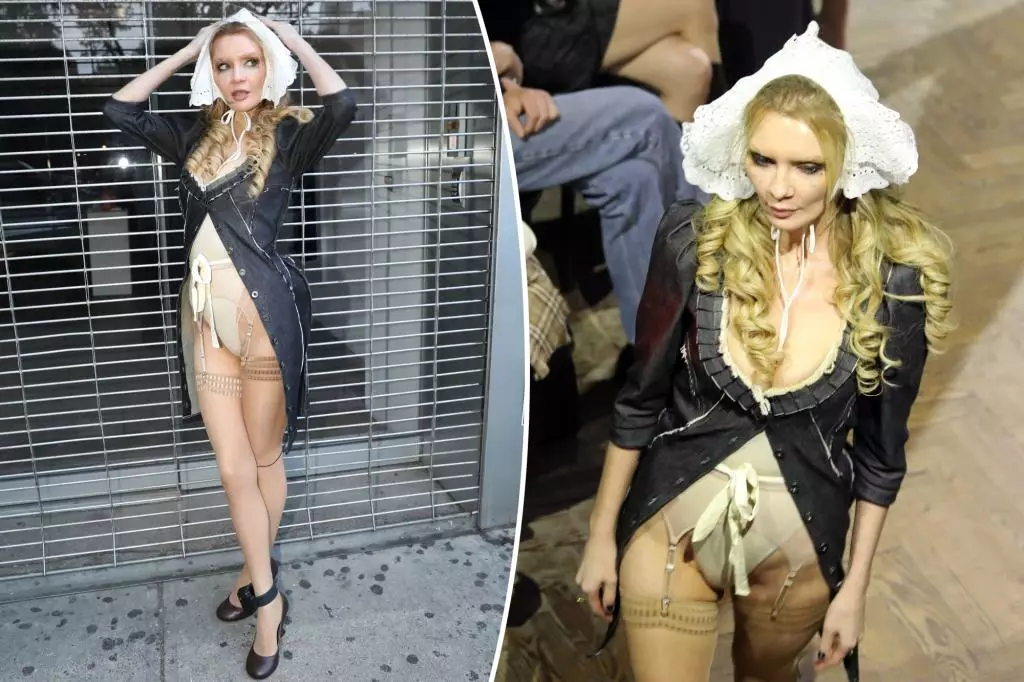In an industry obsessed with surface appearances and polished narratives, Anna Delvey’s presence at Elena Velez’s Spring/Summer 2026 show is a masterclass in reinvention and defiance. Strutting down the runway dressed in nothing more than a nude bodysuit, sheer stockings, and a daring denim coat, she effortlessly blurs the lines between vulnerability and power. The choice to accessorize with a white lace bonnet and her court-ordered ankle monitor isn’t a mere fashion statement—it’s a deliberate act of unapologetic rebellion. Delvey transforms what should be a humiliation into a symbol of resilience, turning her criminal notoriety into a badge of authentic individuality.
Her appearance disrupts the traditional boundaries of fashion shows, which are usually about elegance, exclusivity, and perfection. Instead, Delvey injects raw honesty and controversy, forcing audiences and critics alike to confront uncomfortable truths about societal obsession with appearances and the thin veneer of respectability. Her act of walking the runway in such an unconventional outfit challenges the superficial ideals that dominate fashion and celebrity culture. It becomes a visual manifesto: authenticity, flaws, and defiance are just as compelling—if not more so—than polished perfection.
Redefining Beauty and Self-Care
Beyond the provocative runway walk, Delvey’s personal transformation signals a deeper commentary on self-reinvention. Her claims of dropping 40 pounds and undertaking a rigorous beauty regimen aren’t about vanity but about asserting agency over her own narrative. Her refusal to undergo plastic surgery underscores her desire to remain authentic, emphasizing that her beauty evolution is rooted in natural means rather than artificial enhancements. Treatments like laser facials, vampire facials, and unconventional therapies—salmon sperm, cryotherapy, NAD+ IV drips—are part of her arsenal for self-empowerment, a cry against aging and societal expectations.
Delvey’s candid discussion about ditching Ozempic after experiencing depression challenges the facade of effortless perfection often portrayed in celebrity culture. Her reliance on at-home treatments and low-touch workouts, such as vibration plates, highlights her pragmatic approach to self-care—accessible, real, and unpretentious. In her world, beauty isn’t about perfection but about embracing one’s journey and doing so on one’s own terms. Her attitude toward her appearance becomes an act of rebellion against the often unattainable standards set by the media.
Reclaiming Identity and Public Persona
Since her release from detention—a period marked by legal drama and media scrutiny—Anna Delvey has deliberately crafted an image that combines scandal, style, and self-awareness. Launching “Bunnygate” merch after a false rabbit abandonment scandal, and developing projects with influential figures like Kelly Cutrone, she demonstrates an uncanny understanding of modern celebrity culture: spectacle is power.
Her walk at NYFW in lingerie and an ankle monitor epitomizes her mastery of narrative shifting. Instead of accepting societal shame, she repositions her criminal past as part of her story of resilience and reinvention. She refuses to be pigeonholed as merely a con artist; instead, she becomes a symbol of audacious authenticity and layered complexity. She challenges audiences to reconsider what it means to be a public figure—perhaps even redefining the boundaries between fame, crime, and artistry.
By embracing her persona—flawed, provocative, and unapologetically real—Delvey not only reclaims her narrative but also pushes the industry to consider a broader spectrum of authenticity. Her actions ignite conversation about the power of self-determination in a culture saturated with curated images and manufactured personas. In doing so, she exemplifies how rebellion, whether fashionably or fundamentally, can serve as a catalyst for genuine change.


Leave a Reply